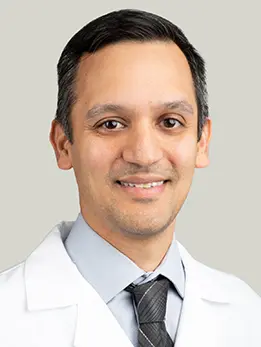AI in the exam room: 5 things to know about UChicago Medicine’s new note-taking tool

Doctors spend a lot of time and effort typing notes into your electronic health record (EHR) during — and after — a visit. This work is a very important part of your care, but it also may be distracting at an appointment, and it can add to physician burnout.
That’s why the University of Chicago Medicine is rolling out a new technology called ambient clinical documentation, powered by Abridge AI, to help doctors provide more efficient and highly personal care.
With the help of artificial intelligence, the tool is used to record the conversation between you and your clinician and transform it into a clear, accurate clinical note for your EHR. Think of it as a well-supervised medical scribe working behind the scenes, said Sachin Shah, MD, Chief Medical Information Officer at UChicago Medicine.
Ambient clinical documentation, which is now used by more than 550 clinicians across the health system, allows doctors “to focus more completely on each patient and spend less time looking at the computer,” Shah said.
You may have questions about how the technology works — and how your privacy is protected. Here are the top things to know about this new AI-powered tool:
1. The AI technology is specialized for healthcare
Like many general-purpose generative AI tools, such as ChatGPT, Abridge AI technology uses a large language model — a type of AI trained on vast amounts of text data. This model allows the platform to comprehend, summarize and generate content.
But Abridge goes further: It’s trained on healthcare-specific data from over 50 specialties and 28 languages, and it has been fine-tuned by experts to produce accurate clinical notes. It is also continually being monitored and updated regularly based on clinician feedback.
2. Patients and clinicians have reported positive experiences with AI
About 200 UChicago Medicine physicians tested this tool through a three-month pilot program. A survey of patients by Press Ganey, a leading healthcare performance measurement provider, showed that use of ambient clinical documentation led to improvements across multiple areas of the patient experience, including:
- Perceived concern shown by the provider
- Satisfaction with explanations about the patient’s problem or condition
- Patients’ perception that they are included in care decisions
“We heard really meaningful feedback from patients, who said things like: ‘My doctor is more present in our conversations,’” Shah said. “We didn’t anticipate such a dramatic impact emerging right away.”
Another survey revealed that participating UChicago Medicine clinicians believed the introduction of ambient clinical documentation made them feel more valued, and 90% reported being able to give undivided attention to patients (up from 49% before the tool was introduced).
3. Clinicians review all AI medical documentation — and they have the final say
Ambient clinical documentation doesn’t operate independently, and it does not make decisions about your care. Doctors thoroughly review, edit and approve each note before it is saved to your medical record to help ensure the final documentation accurately reflects everything discussed during your visit.
UChicago Medicine has an “open notes” policy, Shah said, which means patients can review all clinical notes in their medical records at any time.
“We really do encourage our patients to read their notes — primarily to use them as helpful references, but also to make sure their doctor understood everything they said,” he said. “If they uncover any errors or misunderstandings, they can simply message their clinician to fix them or prompt further discussion.”
4. Your data privacy remains a top priority
Audio recordings made by the tool are used solely to produce the clinical notes before being deleted — often on the same day. UChicago Medicine patient recordings are never kept for more than one week.
“We feel very strongly about safeguarding private health information,” Shah said. “We see no reason to keep data any longer than is necessary to generate the clinical note — no secondary data use, no long-term archives.”
5. You always have a choice to decline ambient AI note-taking at a medical visit
It’s entirely up to you if you’d like your visit recorded and processed by AI. Your clinician will always ask for your consent first. If you decline, your visit will proceed just as before, with no change in your care.

Sachin D. Shah, MD
Sachin D. Shah, MD, provides comprehensive primary care to adults and children of all ages. He serves as Chief Medical Information Officer of UChicago Medicine.
Learn more about Dr. Shah